Redemption Through Love in The Lady of the Camellias || Review [Eng/Esp]
My encounter with this novel marked my adolescence, when reading at least three novels a week was a matter of life or death, and the books were not our own, sometimes we didn’t even know their owners, as we formed long lines among classmates until the copies fell into our hands. It was a time when digital books were still unimaginable, and paper was the only gateway to fantasy.
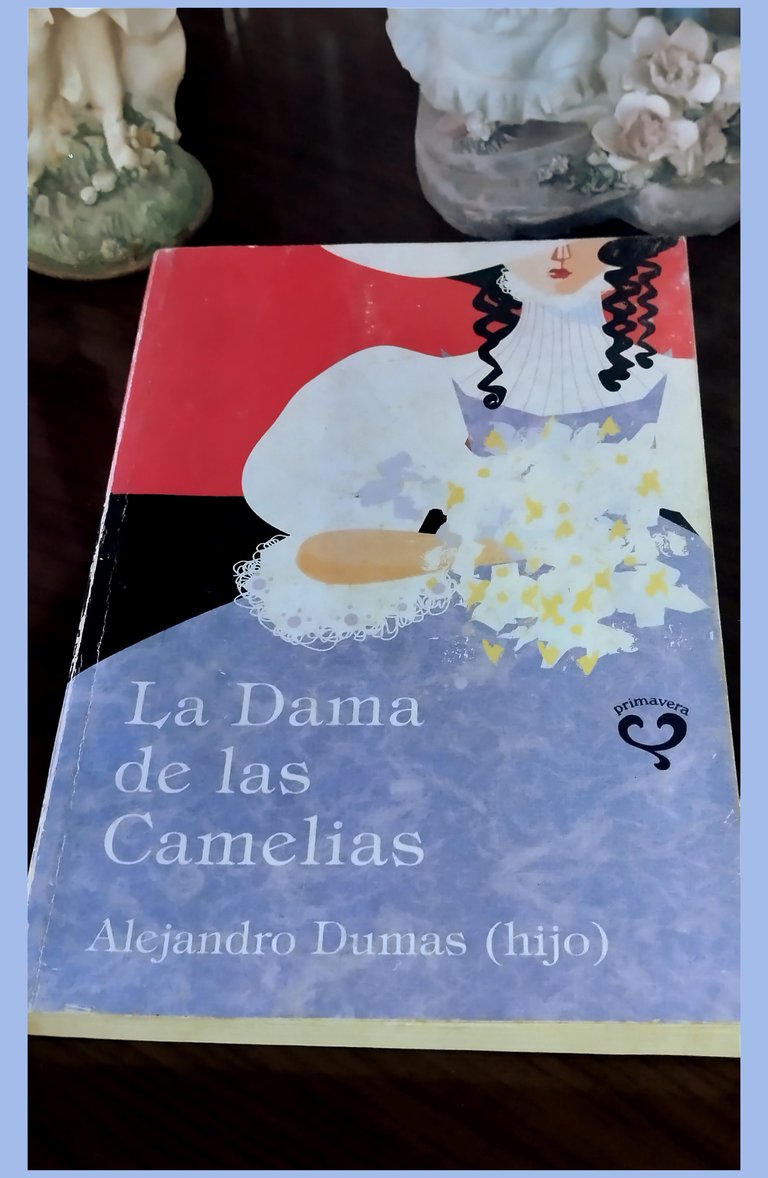
This copy of The Lady of the Camellias that I show you today was acquired years later at a Book Fair, and by then, fantasy could be reached through many different stairways.
This novel, written by Alexandre Dumas (fils), has endured powerfully over time, not only because of its literary beauty but also because of its message: Marguerite Gautier, a courtesan, also takes on the role of a romantic heroine whose sacrifice and capacity for love make her a symbol of redemption.
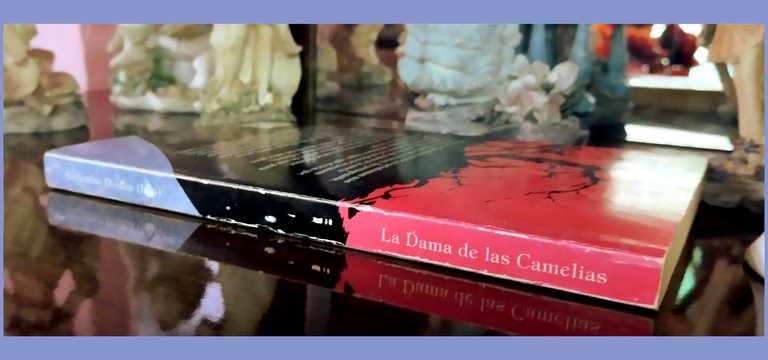
Marguerite is not the typical submissive female figure of her time, for although she lives in a world of luxury and apparent frivolity, her soul is deeply sensitive and yearns for true love. Unlike the respectable women of the bourgeoisie, she is aware of her marginal position, but that does not stop her from loving with an intensity bordering on the sublime. Her relationship with Armand Duval goes beyond fleeting passion, it is a love that transforms her and makes her want to leave behind her life of excess to surrender completely to happiness.
But what makes Marguerite a heroine is her final sacrifice when she agrees to the request of Armand’s father to save his honor and his family’s future. Beyond weakness, this represents all the suffering she is willing to endure for the well-being of the man she loves. This decision leads to her premature death and elevates her as a tragic figure, one who does not die defeated but triumphant, because her love endures beyond betrayal and oblivion.
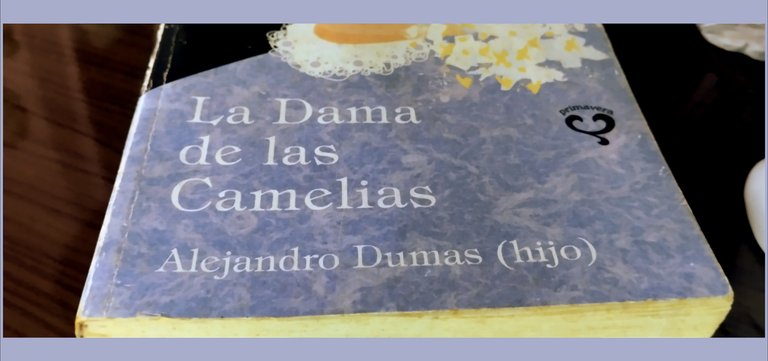
In an era when marriage was more a social contract than a union of love, The Lady of the Camellias proposed a revolutionary idea: that true love could redeem even those considered morally lost.
Dumas (fils) criticizes this double standard, showing that the true sin is not free love but the lack of compassion. That is why this work was scandalous in its time, as it sought to humanize a figure society preferred to scorn.
Upon its publication, it caused a sensation and was linked to the life of Marie Duplessis, a famous Parisian courtesan who defied all social conventions. Following the novel’s release, a theatrical adaptation emerged, and later, Verdi’s famous opera La Traviata, which not only solidified the story’s success but also raised alarms in a society that saw it as a dangerous example of ambiguous morality.
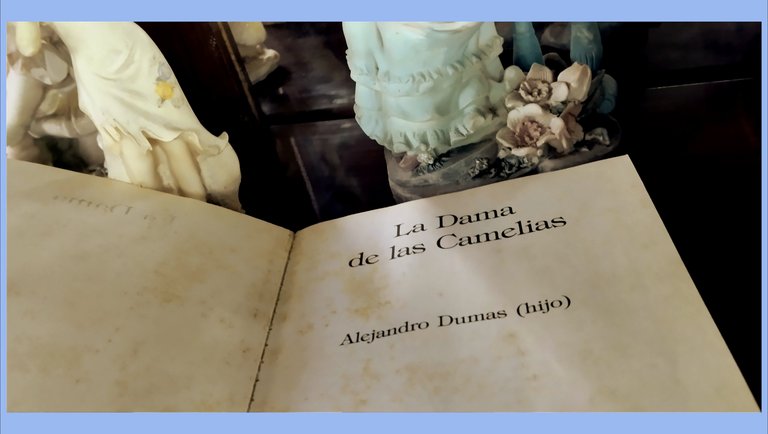
The truth is that the novel sparked debates about the role of women, love, and redemption in a story where the protagonist remains in control of her decisions until the end.
I read this novel perhaps at fifteen, in that edition passed from hand to hand at school, and from the very first pages, I was captivated by this woman during a time when I was beginning to question the world and seek stories that reflected intense emotions. The story made me believe love could be strong enough to justify any sacrifice. Unlike other female literary characters, she does not wait to be saved, instead, she saves Armand, even if he does not understand it until later.
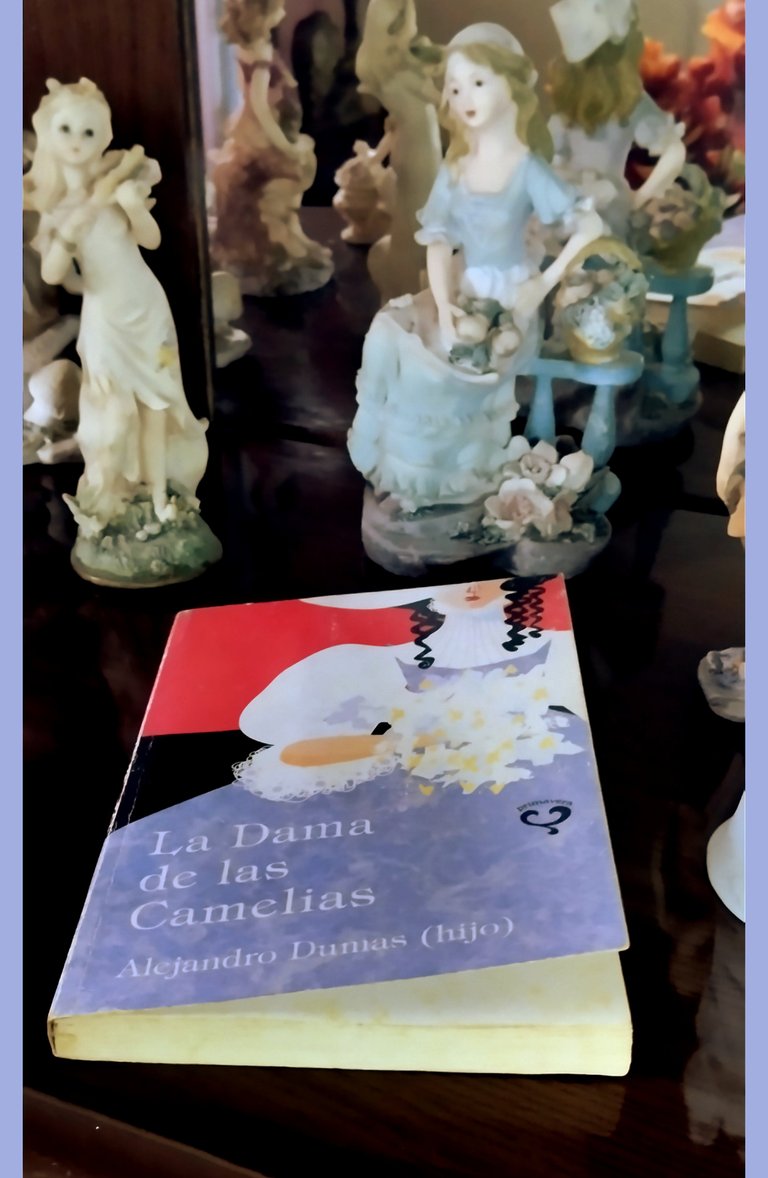
What I understood in that distant adolescence, and what I still believe, is that this story is a reminder that in a world full of conveniences and selfishness, true love, even when it hurts, is the only thing that endures.

✨ 𝑻𝒉𝒂𝒏𝒌𝒔 𝒇𝒐𝒓 𝒓𝒆𝒂𝒅𝒊𝒏𝒈! ✨
𝑰𝒇 𝒚𝒐𝒖 𝒅𝒐𝒏’𝒕 𝒌𝒏𝒐𝒘 𝒎𝒆 𝒚𝒆𝒕—𝑰’𝒎 𝒂 𝑪𝒖𝒃𝒂𝒏 𝒏𝒆𝒖𝒓𝒐𝒍𝒐𝒈𝒊𝒔𝒕 𝒂𝒏𝒅 𝒘𝒓𝒊𝒕𝒆𝒓, 𝒂 𝒎𝒐𝒕𝒉𝒆𝒓, 𝒂 𝒘𝒐𝒎𝒂𝒏, 𝒂𝒏𝒅 𝒂 𝒅𝒓𝒆𝒂𝒎𝒆𝒓 𝒘𝒉𝒐’𝒔 𝒇𝒐𝒖𝒏𝒅 𝒊𝒏 𝑯𝒊𝒗𝒆 𝒂 𝒃𝒆𝒂𝒖𝒕𝒊𝒇𝒖𝒍 𝒔𝒑𝒂𝒄𝒆 𝒕𝒐 𝒔𝒐𝒂𝒓.
𝑨𝒍𝒍 𝒕𝒆𝒙𝒕 𝒂𝒏𝒅 𝒊𝒎𝒂𝒈𝒆𝒔 𝒂𝒓𝒆 𝒎𝒚 𝒐𝒓𝒊𝒈𝒊𝒏𝒂𝒍 𝒄𝒓𝒆𝒂𝒕𝒊𝒐𝒏𝒔, 100% 𝒉𝒖𝒎𝒂𝒏-𝒎𝒂𝒅𝒆 (𝒏𝒐 𝑨𝑰).
𝑩𝒂𝒏𝒏𝒆𝒓 𝒅𝒆𝒔𝒊𝒈𝒏𝒆𝒅 𝒃𝒚 𝑳𝒖𝒎𝒊𝒊.
𝑳𝒐𝒗𝒆𝒅 𝒕𝒉𝒊𝒔 𝒑𝒐𝒔𝒕? 𝑼𝒑𝒗𝒐𝒕𝒆, 𝒄𝒐𝒎𝒎𝒆𝒏𝒕, 𝒐𝒓 𝒓𝒆𝒃𝒍𝒐𝒈 𝒕𝒐 𝒔𝒑𝒓𝒆𝒂𝒅 𝒕𝒉𝒆 𝒘𝒊𝒏𝒈𝒔 𝒐𝒇 𝒄𝒓𝒆𝒂𝒕𝒊𝒗𝒊𝒕𝒚! 💛

VERSIÓN EN ESPAÑOL

La Dama de las Camelias y la redención del amor || Reseña
Mi encuentro con esta novela trascendió en mi adolescencia, cuando era cuestión de vida o muerte leerse al menos tres novelas a la semana, y los libros no eran propios y a veces desconocíamos hasta los dueños, pues hacíamos largas colas entre compañeros hasta que caían los ejemplares en nuestras manos. Era un tiempo donde aún no se soñaba con los libros digitales y el papel era el único escalón a la fantasía.

Este ejemplar de La Dama de las Camelias que hoy les muestro lo adquirí años después en una Feria del Libro, y ya a la fantasía se podía subir por muchas escaleras diferentes.
Esta novela escrita por Alexandre Dumas (hijo) ha transitado con fuerza el tiempo, no solo por su belleza literaria sino por el mensaje donde Margarita Gautier, siendo una cortesana, también toma el papel de una heroína romántica cuyo sacrificio y capacidad de amar la convierten en un símbolo de redención.

Margarita no es la típica figura femenina sumisa de la época, porque aunque vive en un mundo de lujo y aparente frivolidad, su alma es profundamente sensible y anhela un amor verdadero. A diferencia de las mujeres respetables de la burguesía, ella es consciente de su posición marginal, pero eso no le impide amar con una intensidad que raya lo sublime, y su relación con Armando Duval va más allá de una pasión efímera: un amor que la transforma y que la hace querer dejar atrás su vida llena de excesos para entregarse por completo a la felicidad.
Pero lo que convierte a Margarita en una heroína es su sacrificio final al acceder a la petición del padre de Armando para salvar su honor y el futuro de su familia, lo que, por encima de la debilidad, significa todo el sufrimiento que es capaz de encarar con tal del bienestar del hombre amado. Esta decisión la lleva a la muerte prematura y la eleva como figura trágica, donde no muere vencida, sino triunfante, porque su amor perdura más allá de la traición y el olvido.

En una época donde el matrimonio era más un contrato social que una unión por amor, La Dama de las Camelias planteaba una idea revolucionaria: que el amor verdadero podía redimir incluso a aquellos considerados moralmente perdidos.
Dumas (hijo) critica esta doble moral, mostrando que el verdadero pecado no es el amor libre, sino la falta de compasión, por ello, esta obra fue un escándalo en su tiempo al pretender humanizar a una figura que la sociedad prefiere despreciar.
Cuando se publicó, causó furor, y se relacionó esta historia con la vida de Marie Duplessis, una famosa cortesana parisina que desafiaba todas las convenciones sociales. Tras la publicación de la novela, apareció una adaptación teatral y luego la famosa ópera La Traviata, de Verdi, que además de consolidar el éxito de la historia, despertó alarmas en una sociedad que vio allí un peligroso ejemplo de moralidad ambigua.

Lo cierto es que la novela abrió debates sobre el papel de la mujer, el amor y la redención, en una historia donde la protagonista es dueña de sus decisiones hasta el final.
Leí esta novela quizás a los quince años, en aquella edición que pasaba de mano en mano en la escuela, y desde las primeras páginas quedé prendada de esta mujer, en una etapa en la que comenzaba a cuestionar el mundo y a buscar historias que reflejaran emociones intensas. La historia me hizo creer que el amor podía ser tan fuerte como para justificar cualquier sacrificio. A diferencia de otros personajes femeninos de la literatura, ella no espera ser salvada, pues es ella quien salva a Armando, aunque él no lo entienda hasta después.

Lo que comprendí en aquella adolescencia lejana, y lo que aún creo, es que esta historia es un recordatorio de que, en un mundo lleno de conveniencias y egoísmos, el amor verdadero, aunque duela, es lo único que perdura.

✨ ¡𝑮𝒓𝒂𝒄𝒊𝒂𝒔 𝒑𝒐𝒓 𝒍𝒆𝒆𝒓! ✨
𝑺𝒊 𝒂ú𝒏 𝒏𝒐 𝒎𝒆 𝒄𝒐𝒏𝒐𝒄𝒆𝒔: 𝒔𝒐𝒚 𝒏𝒆𝒖𝒓ó𝒍𝒐𝒈𝒂 𝒚 𝒆𝒔𝒄𝒓𝒊𝒕𝒐𝒓𝒂 𝒄𝒖𝒃𝒂𝒏𝒂, 𝒎𝒂𝒅𝒓𝒆, 𝒎𝒖𝒋𝒆𝒓 𝒚 𝒔𝒐ñ𝒂𝒅𝒐𝒓𝒂 𝒒𝒖𝒆 𝒆𝒏𝒄𝒐𝒏𝒕𝒓ó 𝒆𝒏 𝑯𝒊𝒗𝒆 𝒖𝒏 𝒉𝒆𝒓𝒎𝒐𝒔𝒐 𝒆𝒔𝒑𝒂𝒄𝒊𝒐 𝒑𝒂𝒓𝒂 𝒗𝒐𝒍𝒂𝒓.
𝑬𝒍 𝒕𝒆𝒙𝒕𝒐 𝒚 𝒍𝒂𝒔 𝒊𝒎á𝒈𝒆𝒏𝒆𝒔 𝒔𝒐𝒏 𝒅𝒆 𝒎𝒊 𝒂𝒖𝒕𝒐𝒓í𝒂, 100% 𝒉𝒖𝒎𝒂𝒏𝒐𝒔 (𝒔𝒊𝒏 𝑰𝑨).
𝑩𝒂𝒏𝒏𝒆𝒓 𝒅𝒊𝒔𝒆ñ𝒂𝒅𝒐 𝒑𝒐𝒓 𝑳𝒖𝒎𝒊𝒊.
¿𝑻𝒆 𝒈𝒖𝒔𝒕ó 𝒆𝒔𝒕𝒂 𝒑𝒖𝒃𝒍𝒊𝒄𝒂𝒄𝒊ó𝒏? 𝑽𝒐𝒕𝒂, 𝒄𝒐𝒎𝒆𝒏𝒕𝒂 𝒐 𝒓𝒆𝒃𝒍𝒐𝒈𝒖𝒆𝒂 𝒑𝒂𝒓𝒂 𝒂𝒚𝒖𝒅𝒂𝒓 𝒂 𝒅𝒆𝒔𝒑𝒍𝒆𝒈𝒂𝒓 𝒆𝒔𝒕𝒂𝒔 𝒂𝒍𝒂𝒔. 💛
¿Acaso puede alguien resistirse a buscar esta joya y leerla luego de tu reseña?
¡Pues a buscarla y consumirla como se merece porque así nos has motivado para ello!
¡Bravo!
!MMB, !STRIDE, !ZOMBIE
!WEIRD
Adelante, mi amigo 🫂🌻
Cuando ví el nombre de usuario de Yuse, enseguida me remonté a la segunda mitad de los setenta cuando me leí el libro, gracias por tu refrescante recordatorio.
Y yo que todavía no sé porqué eligió ese nombre de usuario... Imagino no sea por este libro, ella no tiene mucho de Margarita 🤭🤭🤭
I've read a lot of book reviews, but after reading yours, I found your explanations very constructive.
Thank you very much. I'm happy that this has encouraged reading.
Me ha encantado esta reseña; y desde mi punto de vista es un tema que está latente en la actualidad. Veo aquí una mujer maravillosa, que a pesar de lo que vivió, su capacidad de amar no se minimizó enfrentando la hipocresía de la sociedad.
Es que el amor no tiene épocas, por eso seguimos llorando con las mismas historias con las que lloraban en el siglo XVII... Todo lo trasciende.
Un placer que me leas, amigo. 🫂🌻✨
The way you portrayed Marguerite's sacrifice and courage was truly heartwarming. Very beautiful analysis.
Marguerite is a heroine, let no one ever dare to doubt that daring to love is also a task for the brave.
Thanks for stopping by and reading me 🫂🌻✨
Muy buena reseña. La dama de las camelias de Alejandro Dumas es una excelente novela. felicidades.
Gracias por pasar y leerme.
Mi abrazo 🤗🫂
Congratulations @neuropoeta! You have completed the following achievement on the Hive blockchain And have been rewarded with New badge(s)
Your next target is to reach 800 upvotes.
You can view your badges on your board and compare yourself to others in the Ranking
If you no longer want to receive notifications, reply to this comment with the word
STOP